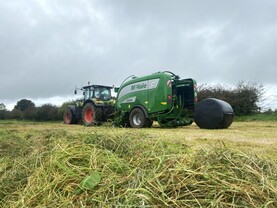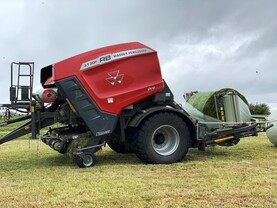The contractor’s life in the north and south of this island is remarkably similar, but differences certainly exist. The biggest problem identified by contractors is whether they can sustain the pressures forced on them by increasing prices.
The cost of fuel, except for this week, has remained relatively high. Insurance has increased, repairs and maintenance have increased, and labour has increased.
The cost for replacement machinery is also rising. A contractor from Northern Ireland purchased a loader three years ago, and his plan is to replace the machine this year. However, the equivalent machine has increased by approximately £30,000 over the three years. Has the value of his secondhand loader increased to reflect the new machine’s price? Will he be able to afford it with current contracting rates?
The contractor made a valid statement: “I don’t want a bigger machine with more technology; I just want a new version of the one I had.”
The argument here is that if machinery companies don’t invest in research and development, then the benefits of development will never appear. But one would wonder if machines have reached their limit in capacity and affordability for contractors.
The same NI contractor explained that, in 1992, he purchased his first self-propelled silage harvester and he could have paid for the replacement mostly out of cashflow. Today, he can barely afford to cover the bank repayments on a new machine at 0% finance. The contractor said that there must be something wrong now.
Timmy O’Brien from the Association of Farm Contractors in Ireland (FCI) said: “It’s a case of very simple maths: can we afford to keep our business going on what we are charging?”
“The contractor is the first call to get the job done, and the last person for payment in many situations,” he said.
Contractors also recognise that good customers are essential and they need to be given a top-quality service. For this, the contractor has to able to respond to meet their needs. This inevitably involves investment in manpower and machines at peak times of the year.
Contracting rates
Looking at the contracting rates between the Northern Ireland and the Republic (Table 3), there is not a huge difference in many of the operations. Silage harvesting is the biggest price difference, but when you look into this, the explanation is fairly clear: most farms in Northern Ireland are taking in at least three cuts per year and often four cuts.
Farms in the Republic are still harvesting one to two cuts per year for the same volume of grass. This results in the contractor picking up heavy swathes and burning plenty of fuel.
In the Republic, a good first cut of silage yields approximately 25 tonnes per hectare (10t/ac). The silage crop yields in Northern Ireland are typically lower at approximately 15t/ha (6t/ac). If the calculation is based on tonnes of dry matter harvested, the cost of harvesting is broadly similar.
The other big difference is slurry application and the hourly rate. This may be due to the volume of application or the length of the journey to fields, causing more wear and tear.
Ploughing appears to be cheaper in the Republic, while one passing of cereals in the North comes in at €25 excluding VAT.
Vat rates
The VAT rate for contracting differs by 6.5%, with customers in the North charged 20% VAT. The reduced rate of 13.5 % VAT applies to customers in the Republic.
VAT charges on diesel are lower in the Republic. Although customers in the North enjoy a reduced rate of VAT of 5% for deliveries of diesel under 2,300 litres, quantities above this amount have a VAT rate of 20%. The ex-VAT price of fuel only has a one cent difference in favour of the Republic.
There is a marginal differential in the cost of lubrication oil: €4 ex VAT cheaper from a John Deere branch in the Republic of Ireland.
At the end of the year, the contractors and farmers are reliant on each other. They have a good idea of each other’s situation. Neither party involved is ending up with a serious pot of money. The trouble for them is cashflow: the contractor has to wait for the farmer to get paid, the farmer has to pay the bank, and then pay the contractor. The contractor still needs to pay the diesel, wages and repayments every month until that cheque comes.






 This is a subscriber-only article
This is a subscriber-only article










SHARING OPTIONS: